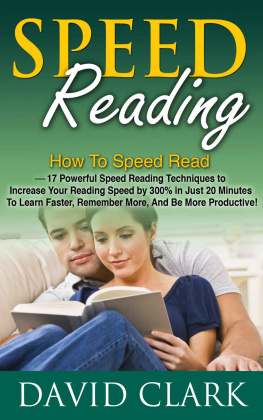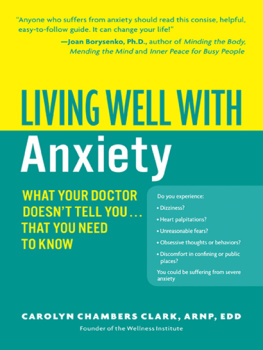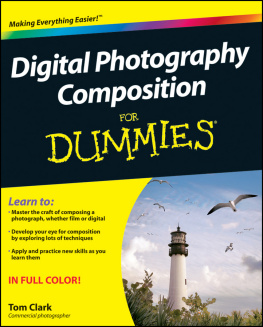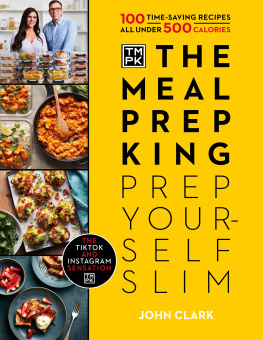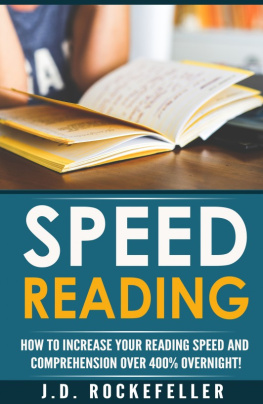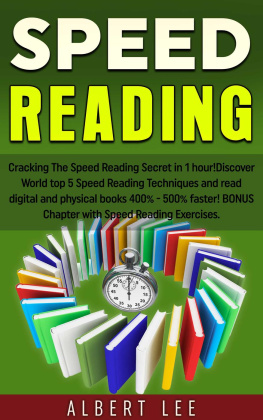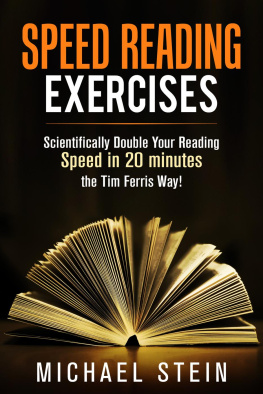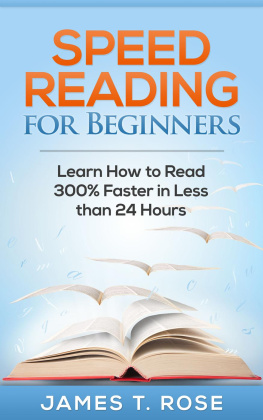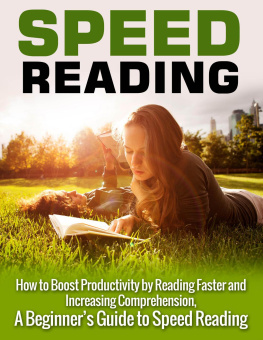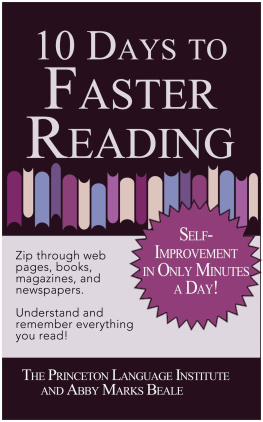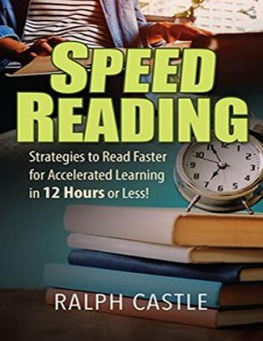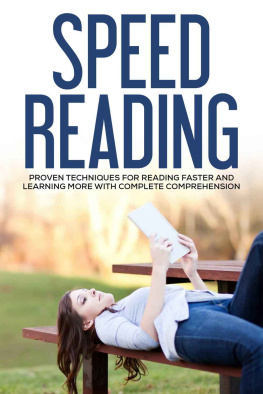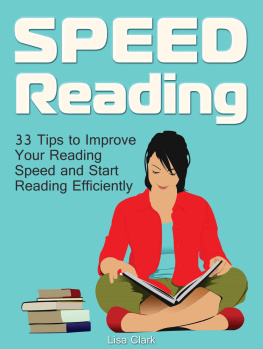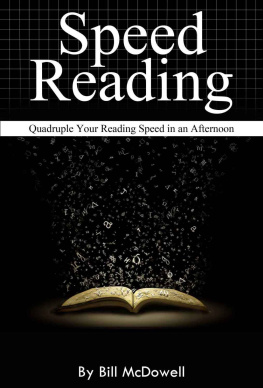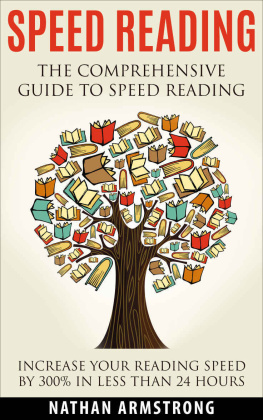How To Speed Read - 17 Powerful Speed Reading Techniques to Increase Your Reading Speed by 300% in Just 20 Minutes To Learn Faster, Remember More, And Be More Productive!
Introduction
Speed reading has gotten a lot of pres s both good and bad. The good press says that if you can read fast, you actually comprehend more of what you are reading. The bad press says that you absorb less when you are reading too quickly.
In actuality, both points of view have some merit. But they miss the biggest point: people who read fast are accomplished at reading. They are not only fast readers, they are good readers.
Even good readers do absorb less when they are pushing at their top rate of speed, skimming along grabbing key words out of text; but at their cruising speed they gather more knowledge at a time, and they usually retain it well.
The good news about all of this is that if you are capable of reading at all, you can learn to read faster. The faster you can read, the more information you can take in at one time, and the easier it is to understand the general concepts of a piece of text.
In just 20minute s the time that it should take an average reader to read through this book at a moderate pac e you can gain the tools you need to become a better reader.
There is nothing mysterious about learning to rea d and even less mystery about learning to read well. It starts with learning to decode the words; tha t s teacher talk for look at the letters and understand what word they make.
It progresses through reading simple sentences, and evolves throughout a reade r s lifetime. Good readers usually derive a great deal of enjoyment from reading.
Being a good reader can open many doors for you. You can become a better student, a better worker. You can increase your comprehension of legal documents, and you can make it through tall stacks of paperwork at a rapid pace.
You can learn new skills without laboring over the text books or directions needed. You can become a better citize n because you can skim through newspaper and Internet articles quickly, enabling you to gather information from a variety of sources.
You can even increase your enjoyment of reading fiction and non-fictio n just for the fun of it.
Reading faster can make your life better. So le t s turn over to chapter one, and get started.
Table of Contents
Introduction
Chapter 1 The Seventeen Ways to Become a Better Reader
Analyzing Why You Want to Be a Speed Reader
Preparing to Learn
Read when you are Alert
Chapter 2 Taking the Plunge into Reading
Chapter 3 Improving Retention
Chapter 4 Computer Assisted Reading Practice
Chapter 5 Planning Your Reading Practice
The Routine
Correcting Bad Habits
You can do it
Chapter 6 List of Computer Programs Designed to Improve Reading Skills
Conclusion
Chapter 1 The Seventeen Ways to Become a Better Reader
Here are seventeen ways to increase your reading speed and your reading comprehension.
- Analyze the purpose for reading.
- Read silently, without subvocalizing.
- Use word shape recognition.
- Check your vision.
- Read in good lighting.
- Read when you are alert.
- Practice reading regularly.
- Time your reading periodically.
- Push yourself to read beyond your best comprehension speed as an exercise.
- Read a variety of material, ranging from very easy to very hard.
- Fit your reading speed to your reading need.
- Learn to read in chunks.
- Avoid re-reading passages.
- Let the words make pictures in your head.
- Move the book away from your face so that you see a wider array of words at once.
- Follow a pointer across the page to reduce your eye movement.
- Use speed reading software to test yourself, and to help push your reading speed and comprehension.
Do these methods look like a lot of hard work and way too many things to do all at the same time? They certainly can be if you do not have a method or routine set up to take you through the steps.
An easy way to do this is to jump straight to number seventeen, and to invest in speed reading software that can help you go through a variety of steps. But speed reading software alone will not teach you to be a faster reader with better comprehension.
Nor will working through the steps above, one at a time in order. But there is a logic behind learning to be a better reader.
Analyzing Why You Want to Be a Speed Reader
There are a broad variety of reasons why you might want to be a speed reader. Maybe you really dont like reading very much and you would like to get it over as quickly as possible. Maybe you are a business person or a student who must get through a large amount of written material daily.
Maybe you are simply struggling with reading, and find that you are falling farther and farther behind your peers because you read slowly with difficulty. The reason that you want to increase your rate of reading will affect your approach to learning to read more quickly, and will affect your commitment to becoming a better reader.
Make no mistake about it: you might be able to read this book in fifteen minutes, but becoming a great reader takes practice just as learning to type quickly and accurately or shooting a basket takes practice.
Preparing to Learn
Assess your ability to read
If you have difficulty with basic reading, you might need some help from a reading coach. However, you can still use the techniques in this book to become a better reader.
Check your vision
Just as you might buy a good pair of running shoes before starting an exercise program, a good first step toward becoming a good reader is to get an eye exam. If your vision needs correction, it will make reading very difficult.
If you are an elementary or high school student, you can ask your school nurse or administrator about free eye exams. If you are an adult, Walmart and other department stores sometimes offer deals on eye exams, and on eye glass prescriptions.
Uncorrected poor vision will definitely slow your reading speed.
Get Comfortable but not too comfortable
Sit in a chair that will allow your feet to touch the ground, and that will support your back. If your body is uncomfortable, your discomfort will intrude upon your reading concentration. If you are reading a large, heavy book, you might want a table or holder for the book.
Just Right Lighting
For good reading, you want light that will allow the letters to make good contrast with the page background; but you do not want light so bright that it glares off the page particularly if you are reading a glossy magazine.
Read when you are Alert
Practice speed reading, or read for comprehension when your brain is fresh
Many people like to read a novel or even a devotional at bedtime. While that can be a good way to go to sleep, it does not promote an increase in your reading speed nor does it improve your comprehension of the material.
Block out time for practice
Schedule time to practice reading two or three times a week, when you are bright, alert, and ready to learn. Your brain gets tired, just as the rest of your anatomy. Your chance of improving a mental exercise, such as reading, is greatly improved if your brain is well-fueled with nutritious food and it is well-rested.
Chapter 2 Taking the Plunge into Reading
When mapping out a journey, it is a good idea to find a starting point. Speed reading works the same way, so your first step is to test your current reading speed.
An average rate of reading for anyone age twelve and above is about 250 words per minute. Reading at that rate will limit your ability to read through text books, business papers or any other heavy reading task.

